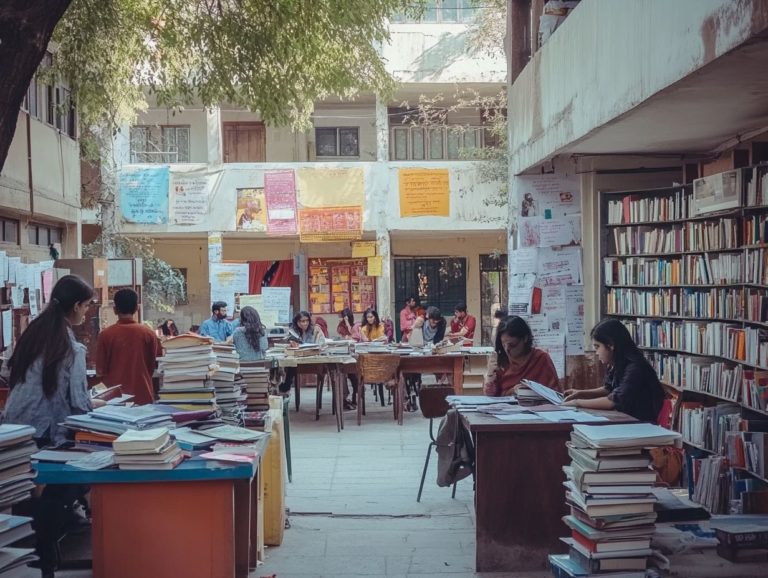Top Study Tips for Students in France
Studying in France presents an unparalleled opportunity. It merges a rich cultural tapestry with world-class education.
Embarking on this thrilling journey demands thoughtful preparation and insight.
From securing your visa and honing your language skills to cultivating effective study habits and adapting to cultural nuances, this guide encapsulates everything you need.
Whether your goal is to achieve academic excellence or seamlessly transition into a new way of life, you ll discover invaluable tips and insights to enrich your experience in France.
Contents
Key Takeaways:

- Start preparations early – secure your visa and make travel arrangements in advance to keep your travel smooth.
- Develop effective time management skills and utilize available resources and support to excel academically.
- Understand the French education system, including class structure and exam expectations, to adapt and succeed in studies.
Benefits of Studying in France
Studying in France presents a wealth of benefits for you as an international student eager to immerse yourself in a rich educational and cultural experience. With world-renowned institutions like Sorbonne and Sciences Po, coupled with vibrant cities such as Paris, Lyon, and Marseille, you ll dive into a vibrant academic scene that opens new horizons.
Learning French sharpens your language skills and helps you connect deeply with the local culture. Scholarships are often available, making higher education more accessible, while student discounts can significantly ease your living expenses. With easy public transport at your fingertips, navigating France will become an integral and enjoyable part of your enriching academic journey.
Preparing for Studying in France
Preparing to study abroad in France demands careful attention to several essential steps that you, as an international student, must follow to ensure a seamless transition. One of the first tasks on your agenda is securing a student visa a process that often involves navigating a detailed array of documentation, including proof of enrollment and information about your accommodation options.
Understanding budget planning is equally vital, as living costs can fluctuate significantly between cities like Paris and Lyon. Researching travel tips now ensures you ll enjoy every moment of your adventure!
Visa and Travel Arrangements
Securing a student visa for studying in France demands meticulous planning and a clear grasp of the necessary documentation and procedures. As an international student, you’ll need to gather critical materials, including proof of financial resources and acceptance letters from your chosen educational institutions, to obtain this essential document.
The journey typically begins with completing the visa application form, often available online for your convenience. After that, you ll need to schedule an appointment with the appropriate consulate, ensuring you allocate enough time for processing this could range from a few weeks to a couple of months, depending on where you are.
It’s crucial to be aware of common pitfalls, such as incomplete applications or inadequate financial proof, as these can lead to frustrating delays in approval.
Once you ve secured your visa, it s time to pivot your focus to travel arrangements. Booking your flights well in advance is advisable, and you should consider transportation options like trains or buses to help you navigate your new surroundings.
Finally, budgeting for these travel expenses will facilitate a smoother transition into life in France, allowing you to acclimate without unexpected financial surprises.
Language Requirements

For international students like you, grasping language requirements is essential for academic success and effective communication while studying in France. Proficiency in French helps you navigate classroom discussions and enriches your overall experience of cultural immersion.
Many educational institutions in France expect you to demonstrate a certain level of French through standardized tests or language certificates. Enrolling in language courses, like those provided by Alliance Fran aise, can be immensely advantageous.
Join immersion programs to live with local families. This exposure to the language and culture makes learning more engaging.
Students who hone their language skills often excel academically and forge deeper social connections. This fosters cultural sensitivity and understanding an invaluable asset in a diverse academic environment.
Effective Study Habits in France
Embracing effective study habits is crucial for you as an international student navigating the French educational system, which values learning on your own and critical thinking.
By grasping the distinct classroom culture in France where your participation and interaction are encouraged you can significantly elevate your academic experience.
Time Management Techniques
Time management techniques are essential for you as an international student striving to excel academically. By mastering effective planning and prioritization, you can boost your productivity and enhance your overall academic experience.
Try using strategies like the Pomodoro Technique, a method of studying that alternates focused work with short breaks. This approach can significantly improve your concentration and retention of information.
Utilizing digital organization tools, such as calendar apps or task managers, helps you visualize your commitments and ensures you meet deadlines without the dreaded last-minute scramble.
Finding a balance between academic responsibilities and social interactions is equally important. Engaging in cultural experiences and forming friendships enriches your time abroad and fosters personal growth, positively influencing your academic performance.
Utilizing Resources and Support
Utilizing the resources and support systems available to you is essential for achieving academic success as an international student in France. Actively seeking assistance from campus services can significantly enhance your educational journey and ease your cultural transition.
This includes tapping into academic advisors for insights into course selection and academic planning. Connecting with student ambassadors provides unique perspectives on navigating life in a new country. Mental health services are vital for your emotional well-being, helping you manage academic pressures.
Joining social networks and student organizations cultivates a sense of community and promotes integration. This gives you the opportunity to forge meaningful connections and support networks that enrich your overall academic experience.

Navigating the French education system presents a unique challenge for international students, as it often diverges greatly from their home countries.
Understanding the nuances of classroom culture, with its strong emphasis on critical thinking and collaborative learning, is crucial for successful adaptation. Don’t wait! Reach out to your academic advisor today!
Understanding Class Structure and Expectations
Understanding class structure and school requirements is crucial for you as an international student studying in France. These elements can differ significantly from what you might be used to back home. Most classes involve a mix of lectures, group work, and presentations. All of these are designed to foster your participation and engagement.
In fact, active participation is essential for success in these environments. Your professors may assess you through speaking tests that gauge your knowledge and test your ability to articulate your thoughts clearly and confidently. Group projects also play a significant role, where collaboration and cultural exchange can greatly enrich your learning experience.
The dynamics within the classroom reflect varying cultural attitudes toward teamwork and communication. This influences how you and your peers interact and share opinions. Thus, grasping these factors is vital for anyone aiming to thrive in the French educational landscape.
Tips for Success in Exams and Assignments
Achieving success in exams and assignments is crucial as you navigate the French educational system, where evaluation methods may differ significantly from those in your home country. By developing effective study strategies and understanding the grading criteria, you can enhance your academic performance.
One key strategy is to familiarize yourself with the specific formats of exams, which can include oral presentations and written tests, blending theoretical and practical assessments. Forming study groups fosters collaboration, allowing you to exchange ideas and tackle challenging concepts together.
Using effective note-taking techniques, such as the Cornell method or mind mapping, will help you organize information to boost retention. Seek feedback from your professors, as their insights can provide invaluable guidance for improvement.
Use available academic resources like tutoring centers and online databases to master the course material and build confidence in your abilities.
Adjusting to Life in France
Embrace the thrilling challenges and exciting opportunities that come with life in France! Adjusting offers you a blend of thrilling challenges and opportunities as you navigate the cultural nuances and carve out your student experience.
By embracing cultural sensitivity and immersing yourself in local traditions, you can facilitate a smoother transition and promote personal growth during this enriching journey.
Cultural Differences and Adaptation

Cultural differences can present unique challenges as you adapt to life in France, influencing your social interactions and overall experiences. Understanding and respecting these differences is essential for fostering meaningful connections with the local population.
You may navigate various communication styles, from the directness characteristic of some cultures to the more nuanced approaches often observed in French interactions. Social norms like the importance of punctuality (being on time) or how people greet each other can vary quite a bit.
Dining etiquette, including table manners and expectations around meal times, might also bring about some initial discomfort. Common French customs include waiting for everyone to be served before starting to eat.
To ease your transition, observe local customs, ask questions when you’re unsure, and share your own cultural practices. This not only enriches your experience but also helps build bridges and foster mutual respect within your new community. Start exploring these cultural practices today!
Maintaining Mental and Physical Health While Studying
Maintaining your mental and physical health is vital as an international student in France. The pressures of academic life and cultural adjustments can take a toll on you.
Establish a healthy balance between your studies and self-care for your overall well-being. Regular exercise can do wonders.
It boosts your physical health and elevates your mood, reducing anxiety. Join campus fitness classes or local running groups to improve your fitness and connect with peers.
Socializing is essential. Engaging in activities with fellow students fosters belonging and alleviates feelings of isolation.
Don t overlook campus health resources like counseling services and workshops promoting healthy living. By prioritizing your mental and physical health, you can kickstart an amazing journey abroad.
Frequently Asked Questions
What are the top study tips for students in France?
1. Stay organized: Keep track of deadlines, assignments, and exams to avoid falling behind.
2. Use resources: Take advantage of libraries, study groups, and online resources to supplement your learning.
3. Practice time management: Create a schedule and stick to it, allotting specific times for studying and leisure.
4. Immerse yourself in the language: Surround yourself with French speakers, watch French TV shows, and practice speaking as much as possible.
5. Take breaks: Give your brain a rest and recharge. Breaks help avoid burnout.
6. Stay motivated: Remember your goals and why you chose to study in France. This will keep you focused.






